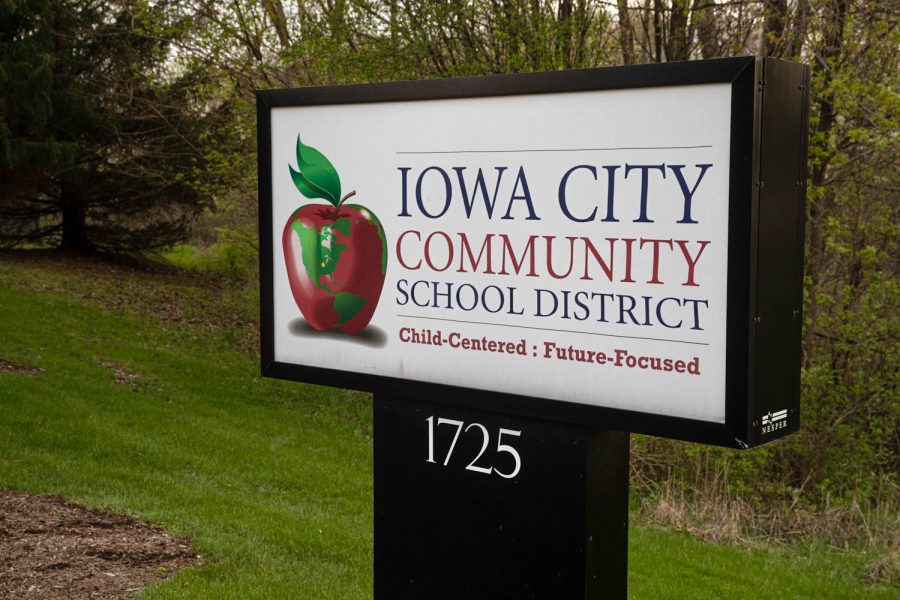UI students advocate for inclusive curriculum at ICCSD after speaker uses ‘white power’ symbol in meeting
After a white resident ranted about the district’s curriculum relating to people of color and the LGBTQ+ community during the last school board meeting, several members of the community, including UI students, spoke out in support of the school board and to condemn white supremacy.
A sign for the Iowa City Community School District is seen outside the district’s administration building on Tuesday, April 28.
July 28, 2021
Iowa City residents and students showed up to Tuesday’s Iowa City Community District School Board Meeting to fill a room with signs and shirts supporting Black Lives Matter, Indigenous groups, and the LGBTQ+ community.
Two weeks prior, at the first in-person meeting of the school board in over a year, the ICCSD meeting was interrupted by a guest’s anecdotal stories of frustrated parents over the curriculum and the district-wide diversity and equity newsletter.
The speaker, Joseph Dobrian, is a Johnson County resident who does not have children in the district.
He ended his comments with the use of a hand gesture known to symbolize “white power,” in certain contexts, according to the Anti-Defamation League.
According to the Iowa Freedom Riders, school board Vice President Ruthina Malone, a Black woman, has been the subject of several racist overtures, such as emails including racial slurs and offensive name-calling.
IFR said in a social media post following Dobrain’s appearance that he had positioned himself in front of Malone to intimidate her, and they encouraged members of the community to attend the next meeting to show solidarity with the Black members of school board members and denounce white supremacy.
ICCSD President Shawn Eyestone, opened the meeting’s public comment section by addressing Dobrian from the previous week head-on before he was allowed to speak.
He said the “white power” gesture or any verbal or non-verbal act of aggression has no place in the public meeting.
“I will tell you that the symbol you made at the last meeting is widely recognized as a white power symbol and is formally recognized as such by the Anti-Defamation League since 2018,” Eyestone said. “… If you or anyone else repeat such actions, they will be removed from the building.”
Dobrian said the public has not heard comment from the district as to which parts of the curriculum are being reviewed at each grade level, which parts of the original curriculum were considered objectionable, and what the district proposes to replace them with.
“This is particularly unsettling in view of the district’s stated intention to review material for ‘cultural inclusiveness’, which is ambiguous and often code for far-left, identity politics,” Dobrian said in the closing of his public statement.
Several members of the community and ICCSD students stood up after Dobrian to support the school board’s review of the social studies curriculum – two of whom were University of Iowa undergraduates, Emmy Lane Palmersheim and Autumn Diesburg.
Palmersheim addressed the board directly first.
“I would like to implore the board to look at board meeting policy moving forward, so we can intervene and proactively condemn white supremacy, instead of trying to make reactionary guidelines,” Palmersheim said.
Diesburg described her childhood to the audience, as a student that “grew up in rural Iowa schools,” Diesburg said she did not have a multicultural education.
“I did not have an education that was providing me with accurate histories of Black and Indigenous peoples or any people of color in this country,” Diesburg said. “I wish I had. Now at the University of Iowa, I’ve had the opportunity to learn so much more.”
Diesburg said all students in the ICCSD should have the opportunity to be taught to think critically.
“There isn’t equal access to colleges in the first place,” Diesburg said. “We can’t leave it to universities.”




